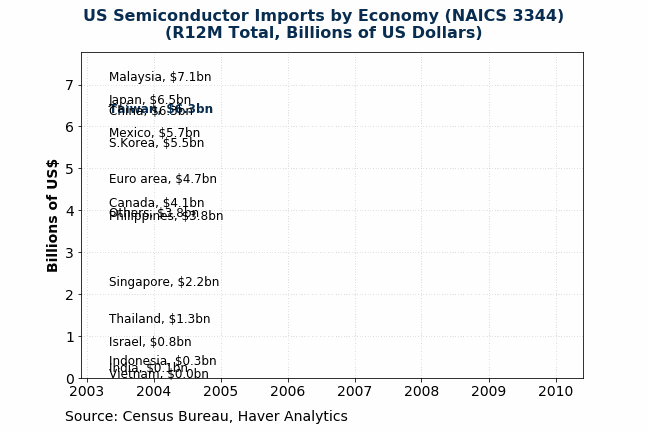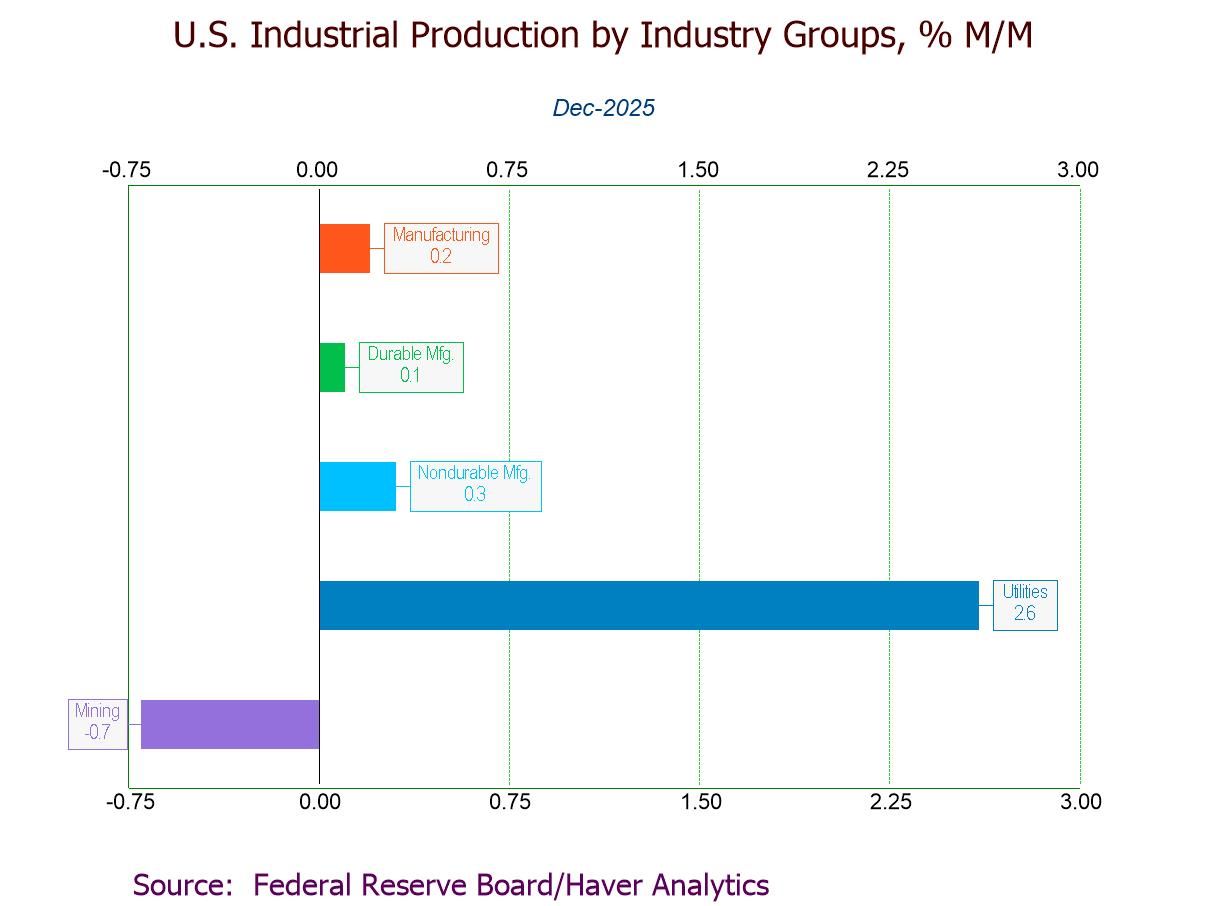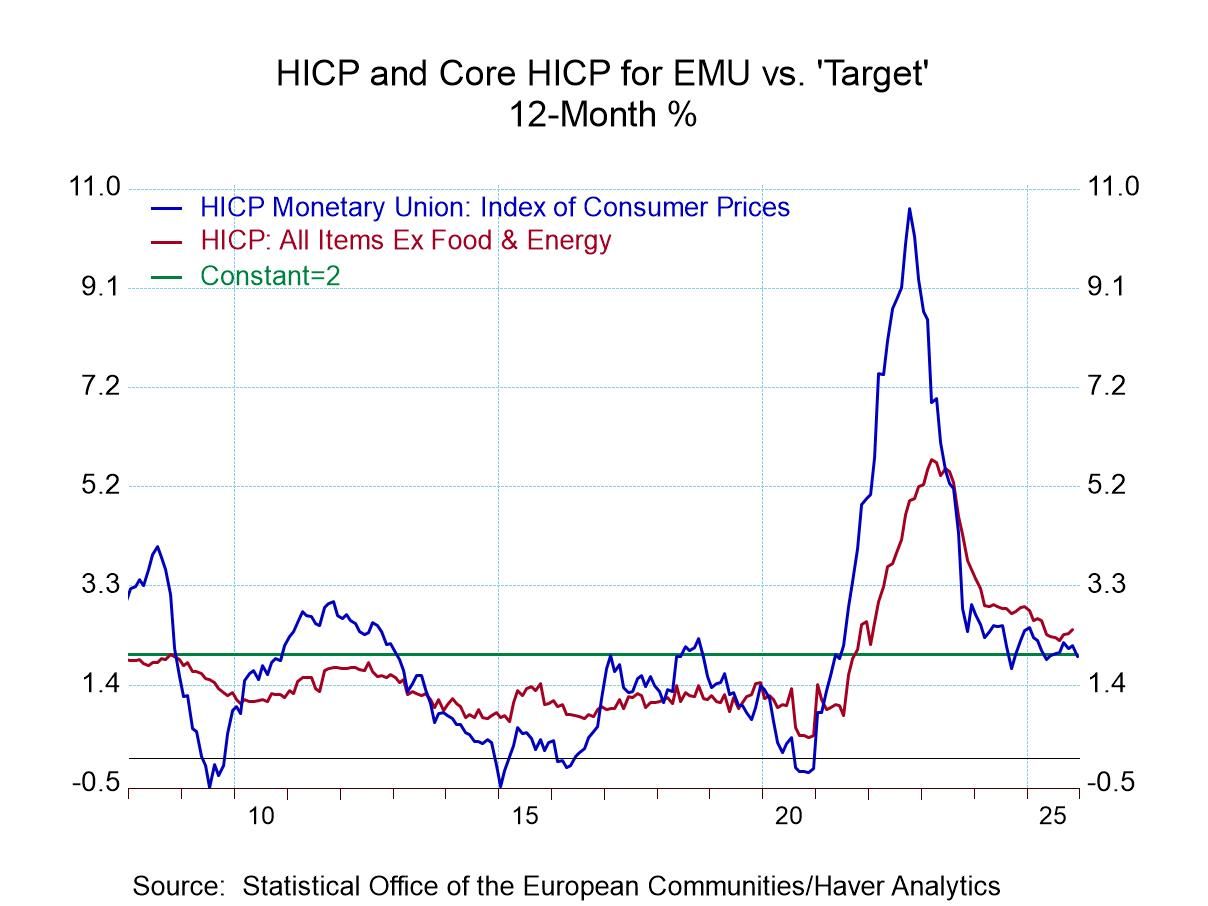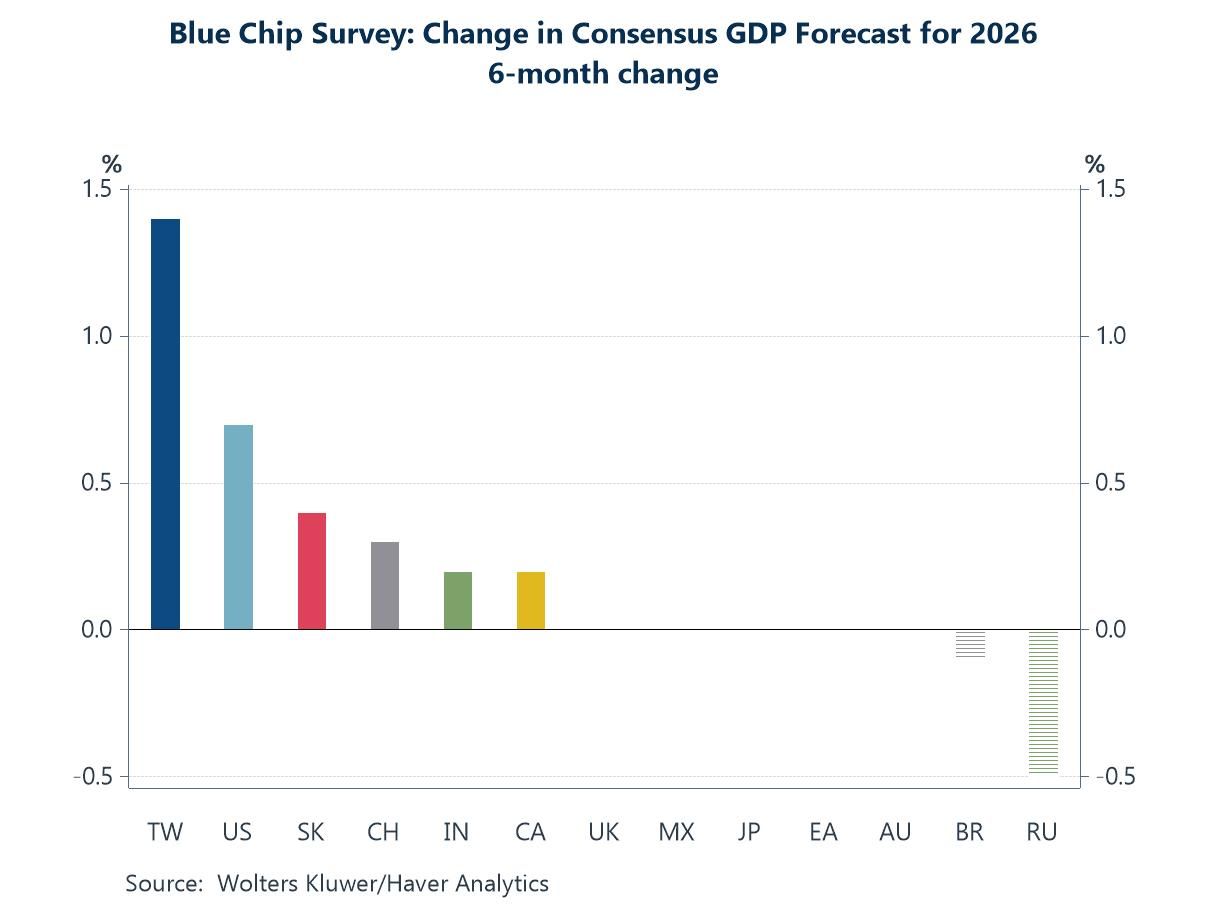 Global| Oct 06 2010
Global| Oct 06 2010German Factory Orders Only Make The Puzzle Harder To Solve...Germany Surprises As Orders Come Roaring Back
Summary
Growth scare is OVER! German factory orders spurted in August after giving growth a scare in July and dropping by 1.6% (revised and smaller drop than was first reported). While we know that within Germany retailing and consumer [...]
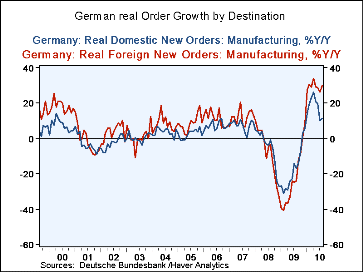 Growth scare is OVER! German factory orders spurted in August after giving growth a scare in July and dropping
by 1.6% (revised and smaller drop than was first reported). While we know that within Germany retailing and consumer
sentiment are improving, but domestic industrial orders continue to lag. Domestic orders fell by 0.5% in August. After
barely edging higher in June and in July they are now outright lower. As a result domestic orders actually are down in
Q3-to-date calculations (see table) at a 0.7% annual rate. German real sector domestic sales did rebound in August,
rising by 1.8% but only after falling by more than a cumulative 1% over the previous two months. That weakness seems
to have hit domestic orders with lag. Does the new 1.8% rise say that the domestic portion of the economy is out of the
woods? We can’t tell and German data have been far too erratic to warrant any guess-work here. There are too many cross
currents here to dignify any guess work by calling it 'forecasting,' but some will.
Growth scare is OVER! German factory orders spurted in August after giving growth a scare in July and dropping
by 1.6% (revised and smaller drop than was first reported). While we know that within Germany retailing and consumer
sentiment are improving, but domestic industrial orders continue to lag. Domestic orders fell by 0.5% in August. After
barely edging higher in June and in July they are now outright lower. As a result domestic orders actually are down in
Q3-to-date calculations (see table) at a 0.7% annual rate. German real sector domestic sales did rebound in August,
rising by 1.8% but only after falling by more than a cumulative 1% over the previous two months. That weakness seems
to have hit domestic orders with lag. Does the new 1.8% rise say that the domestic portion of the economy is out of the
woods? We can’t tell and German data have been far too erratic to warrant any guess-work here. There are too many cross
currents here to dignify any guess work by calling it 'forecasting,' but some will.
Consumer demand trails events/all sectors trail past cycle peaks - Orders for consumer goods are down sharply in August by 2.4% it is the second drop in three months for these orders. Capital goods orders are up and this month they reverse a two-month string of declines. Total orders are still some 12% below their pre-downturn peak. Foreign orders are still off peak by 11%. While domestic orders trail their past peak by some 14%.
Germany does it with exports alone - Germany continues to make gains off external demand with domestic demand anemic. Demand for investment goods was driven by a 23 percent jump in orders from within the euro region- that signals that there is life elsewhere in the e-Zone. But Germany is engaging in beggar-thy-neighbor policies and that will not be good for international relations, economic stability or the FX markets.
Euro is up on ECB silence and German austerity - For now the ECB is not talking about easing so the Euro is rising as the dollar and yen remain weak on the prospect of QE in those markets. The IMF is warning about currency wars. But Germany has eschewed everything we know about economics to turn from stimulus after an economic catastrophe to push for austerity at home. Granted this was prompted by internal political concerns in what may be the most fiscally conservative country in the world. And it was motivated by growing debt problems in much of the rest of the zone. But Germany is growing by leaching off domestic demand elsewhere.
Risk grows - Demand is the scarce global 'commodity'. Germany is fueling its economy which is running on empty due domestic austerity on fuel found abroad- domestic demand in other countries, exploited by German exports. How long can this last?
QE, The new game in town - The US 'promise' to use Q-easing is battering the dollar a dangerous effect. The Fed has not uttered a word about it because FX policy is the domain of the US treasury. But if there is a channel through which QE can work it is this one and, as you can see, it is dangerous and potentially inflammatory.
Problem as solution or vice versa? The world economy needs growth. By ramming German growth up on demand purloined from other countries, Germany is actually part of the problem while seeming to be part of the solution (posting strong growth).
Strange days - These are strange times. Nothing is exactly what is seems; Columbia University economist Joseph Stiglitz has been critical of the monetary expansions in the US and Japan and in Europe. He sees little way that QE will work. It will not work by lowering US interest rates. Lower US interest rates have merely resulted in the rich getting richer. Banks, for credit reasons, are redlining most of the needy homeowners. Cash rich Microsoft raised cheap bond money to engage in share buy-backs and now the Yankee bond market is lit up like a Christmas tree on December 25th with foreign buyers flocking in for that cheap money. How does that help the US economy? Answer: It does not. It is hurting the dollar.
Love the one you're with? - Since fiscal policy is being held in a straight jacket globally the push for growth is being funneled through central banks and this is a great monetary mystery. So far inflation expectations are low and long term interest rates are still low along with them. But the tanking dollar will change all that. The tanking dollar is pressuring the euro higher and at some point Germany's neat export-led game will come to an end as its exporters will compete with a too-cheap dollar. At that point will Germany back off on austerity are give way to weaker growth? It will probably forsake growth.
War! What is it good for? The IMF is warning about this currency game. But no one is taking action. The US and others have pressured China which is digging its heels in even as it says it intends to push for more 'stable' growth and will develop domestic demand. China is the original keep-your-currency-cheap country. Will it really shift emphasis to domestic demand? Or is this a Chinese promise with the potential to satisfy the taste buds but not the stomach? China continues to play masterful politics; it is pledging to use some of its vast exchange reserves (acquired through its cheap currency policy) to help Greece.
More confusing than derivatives - I think this whole situation is so complex we need a grand chess master to keep track or who is in front and who has the advantage. This is not tennis where the scoring is clear, but the ball is being hit back and forth with great fury and pace.
How could this not end badly? For now stock markets seem to like 'all this' but they are not advancing on trends that are fundamentally sound. The P/E levels do not seem stretched but they could get here and all you need is a real whiff of inflation to send interest rates higher and make the P/E-to-interest rate comparison a bigger challenge for stocks. The problem for the US – or the conundrum- is that the US exports are too small to carry growth in GDP. But the damage that a weaker dollar can do to other economics is still palpable. Cutting US imports could be more productive. But imports are more from China where the FX effect is largely absent. Germany is very dependent on exports but these will slow as the euro rises. It is domestic demand that is lacking in the world: what is scarce is domestic demand. With fiscal policy squeezing demand on a global scale and too much emphasis placed on monetary policy to put it back, how could this not end badly?
| German Orders and Sales By Sector and Origin | ||||||||
|---|---|---|---|---|---|---|---|---|
| Real and SA | % M/M | % Saar | ||||||
| Aug-10 | Jul-10 | Jun-10 | 3MO | 6Mo | 12Mo | YrAgo | QTR-2-Date | |
| Total Orders | 3.4% | -1.6% | 3.6% | 23.9% | 11.3% | 21.2% | -20.9% | 12.3% |
| Foreign | 6.6% | -3.0% | 6.6% | 47.7% | 21.5% | 30.0% | -24.1% | 24.0% |
| Domestic | -0.5% | 0.2% | 0.1% | -0.8% | -0.4% | 11.1% | -16.9% | -0.7% |
| Real Sector Sales | ||||||||
| MFG/Mining | 1.8% | -0.6% | -0.5% | 2.8% | 1.4% | 10.9% | -18.5% | 4.8% |
| Consumer | -2.4% | 1.1% | -0.2% | -5.7% | -2.9% | 0.4% | -8.8% | 1.3% |
| Cons Durables | -3.9% | 3.2% | -1.2% | -7.7% | -3.9% | 8.7% | -21.6% | 11.1% |
| Cons Non-Durable | -2.0% | 0.7% | 0.0% | -4.9% | -2.5% | -0.7% | -6.6% | -0.1% |
| Captial Gds | 3.8% | -2.5% | -0.7% | 2.4% | 1.2% | 13.5% | -24.3% | 2.6% |
| Intermediate Gds | 1.3% | 1.4% | -0.7% | 7.9% | 3.9% | 13.9% | -16.3% | 10.6% |
| All MFG-Sales | 1.8% | -0.6% | -0.4% | 3.2% | 1.6% | 11.0% | -18.4% | 5.2% |
Robert Brusca
AuthorMore in Author Profile »Robert A. Brusca is Chief Economist of Fact and Opinion Economics, a consulting firm he founded in Manhattan. He has been an economist on Wall Street for over 25 years. He has visited central banking and large institutional clients in over 30 countries in his career as an economist. Mr. Brusca was a Divisional Research Chief at the Federal Reserve Bank of NY (Chief of the International Financial markets Division), a Fed Watcher at Irving Trust and Chief Economist at Nikko Securities International. He is widely quoted and appears in various media. Mr. Brusca holds an MA and Ph.D. in economics from Michigan State University and a BA in Economics from the University of Michigan. His research pursues his strong interests in non aligned policy economics as well as international economics. FAO Economics’ research targets investors to assist them in making better investment decisions in stocks, bonds and in a variety of international assets. The company does not manage money and has no conflicts in giving economic advice.



